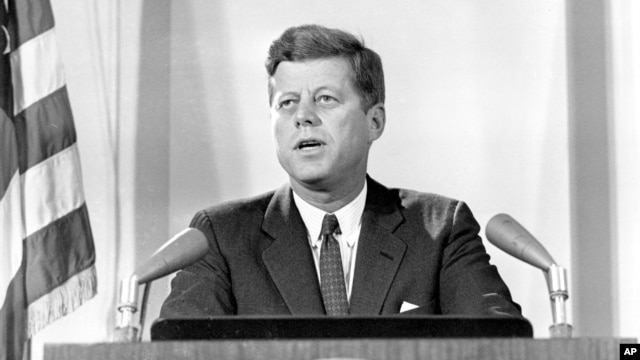Thirteen days in October 1962 that scared America.
Erratic Castro upset Soviet missile plan
- From: AP
- October 13, 2012 12:00AM

A Sopka missile deployed during the missile crisis of 1962 is displayed at Morro Cabana complex, in Havana. Picture: AFP Source: AFP
FIFTY years after the Cuban missile crisis, a new book says the Soviets had secretly planned to leave 100 nuclear missiles in Cuba but changed their mind because of Fidel Castro's erratic behaviour.
CIA documents also being released half a century after the Cold War drama shine a light on the tense two weeks in which the two superpowers came close to nuclear war.
In late 1962, Soviet premier Nikita Khrushchev ordered a secret deployment of nuclear missiles in Cuba that were soon detected by US spy planes. On October 16 that year, US president John F. Kennedy was briefed on photographic proof of the missile sites being developed.
US officials determined that the medium-range missiles would be able to reach key sites within 1600km of Cuba in minutes. Soon after, they learned of longer-range missiles that could reach most of the US.
Kennedy's team agreed the missiles would not be tolerated. The ensuing standoff with Khrushchev over 13 days became "the most dangerous moments the world has ever faced, either before or since - the closest we came to nuclear destruction", according to historian and author Michael Dobbs, who helped preview a new US National Archives exhibit, To the Brink: JFK and the Cuban Missile Crisis.
Documents in the exhibition show the Kremlin had been rattled by Castro's temper, says a new book The Soviet-Cuban Missile Crisis, by Svetlana Savranskaya, and Sergo Mikoyan, late son of the then Soviet deputy foreign minister, Anastas Mikoyan.
Minutes of a meeting with Anastas Mikoyan show Castro was furious at the Soviet Union ending the crisis by agreeing to remove its strategic missiles.
Unknown to Washington, the Soviets had left 100 tactical nuclear weapons in Cuba, and documents suggest they planned to train Cubans how to use them.
But Mikoyan was so concerned at Castro's erratic behaviour during a diplomatic visit that he wrote back to Moscow that they must urgently take back the remaining bombs.
"What do you think we are?" an emotional Castro asked during a four-hour November 22 meeting when he learned of the Soviet decision. "A zero on the Left? A dirty rag? We tried to help the Soviet Union to get out of a difficult situation."
Mikoyan was driven to cite a non-existent Soviet law banning the transfer of tactical nuclear weapons to other countries. "And when are you going to repeal that law?" Castro asked. "We will see," Mikoyan said.
Commenting on the material in the US exhibition, Dobbs said yesterday that both Kennedy and Khrushchev had made mistakes leading up to the crisis.
Khrushchev had gambled by deploying nuclear weapons so far from the Soviet Union on the US doorstep. And Kennedy fumbled his first major foreign policy crisis at the Bay of Pigs with the failed effort to topple Castro. Furthermore, the Kennedy administration's campaign to overthrow Castro, called Operation Mongoose, triggered a dramatic Soviet reaction.
Khrushchev is described in CIA documents as "an obtuse, rough-talking man" but shrewd and having "a touch of a gambler's instinct".
"You don't really have to be an expert or Cold War historian to grasp the stark human drama that this story really is," said Stacey Bredhoff, organiser of the exhibition.
"One of the things that struck me ... was the extent to which (Kennedy) didn't really know and didn't fully control what was happening," said Dobbs. "He didn't know that the Soviet Union had 42,000 troops on Cuba, ready to resist an American invasion."
A CIA document outlines plans to assassinate Castro, including a 1964 plot with mafia connections. The mob and "patriotic Cuban exiles" settled on a payment of $US100,000 for assassinating Castro, $US20,000 for his brother Raul and $US20,000 for Che Guevara, plus $US2500 for expenses.
AP




 Reply With Quote
Reply With Quote Cuban Crisis, missile range
Cuban Crisis, missile range






Bookmarks